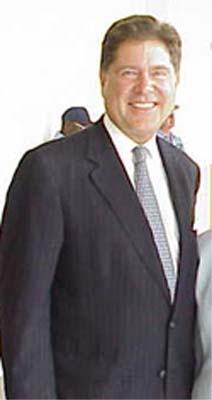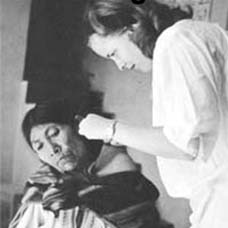
RPCV Alberto Ibargüen says: "Perhaps the Bill of Rights' most brilliant insight is the assumption in the First Amendment that the free flow of ideas is the antidote to corruption and dictatorship as surely as light is the antidote to darkness."
Free Speech is Risky Business
By Alberto Ibargüen
When a columnist in Miami criticizes the local police chief, there are consequences: Readers write, the chief objects, the mayor might comment and a discussion proper to a democracy ensues.
Contrast that to when Orlando Sierra exposed corruption in his Colombian city and then received a bullet to the head while standing outside of his newspaper next to his little girl. Or compare it to when Ronaldo Santana de Araujo exposed local government corruption in his hometown in Bahía, Brazil, and in broad daylight was shot to death in the town square.
In Haiti, a dum-dum bullet ripped out the throat of radio commentator Jean Leopold Dominique. And in Tolima, Colombia, circulation manager Elizabeth Obando was dragged off a bus, shot and lay mortally wounded by the side of the road for hours before her assailants allowed her to be taken to a nearby hospital where she died two days later. Her offense? She sold and distributed a newspaper that reported the actions of the terrorist FARC guerrillas.
These are not long-ago events. Just last week, mere miles from where the Inter American Press Association met the week before to celebrate free speech, Roberto Mora García, an editorial writer for Mexico's El Mañana newspaper, was stabbed to death.
More than simple homicides, these murders strike at the heart of democracy by silencing speech. For years, this type of crime went unpunished in many parts of our hemisphere and, often, not even prosecuted. Despite real danger and intimidation, the press in Latin America and the Caribbean has shown remarkable examples of courage.
The courage of independent journalists in Cuba is well known, as is the severity of the dictatorship, sentencing scores of them to jail for the crime of publishing what they know or what they believe. Less well known is the courage of editors and reporters at El Periódico, Prensa Libre and Siglo 21, Guatemalan newspapers under siege by right-wing allies of a former dictator. Or the courage of Venezuelan television, radio and print reporters and photographers under pressure from left-wing President Hugo Chávez. Yet, they go on.
Colombia is the most dangerous place on Earth to be a journalist. There, narco-trafficking leftist guerrillas and right-wing paramilitary groups have sought to destabilize civil society by attacking the basic institutions of a democracy: the courts, elected officials and the press.
In a conversation with the Colombian Supreme Court's chief justice some years ago, he agreed that the murder of a journalist was not a mere homicide because it also silenced an essential element of democracy. His shoulders slumped as he said that he also felt that way whenever one of his judges was killed. The goal of the guerrillas is to instill fear and intimidate the press into silence by killing 125 journalists since 1988. Yet, with enormous courage, journalists persevere.
What could cause journalists to be so feared? What makes such a range of powerful people, left-wing and right-wing, terrorist and state-sanctioned, choose to kill them? It is because there is such power in information and ideas.
Very little bothers the powerful more than contradiction or dissent. When contradiction comes in the form of a dissenting opinion or discrediting information, bullies lash out violently, and brutes resort to murder. When a journalist reports corruption in government or the perversion of justice, offers an opinion about the misuses of power or details the cynical cruelty of terrorist groups, someone's interest will always be affected.
In the United States, the Founding Fathers framed the Constitution and the Bill of Rights around concepts of individual freedom. Perhaps the documents' most brilliant insight is the assumption in the First Amendment that the free flow of ideas is the antidote to corruption and dictatorship as surely as light is the antidote to darkness. That freedom was a revolutionary concept 200 years ago, though now it is so engrained in our culture that we take it for granted.
In South Florida, one of our great opportunities is to create order from the seemingly chaotic energy of many cultures and languages. We are a region of strivers and sometimes let our differences get in the way of our own progress. But our world is one of order, by comparison. And it is a world we should keep, improve and defend.
In an ever more globalized world, one way of keeping it is by helping to raise standards everywhere. This should be our cause in concert with democrats in neighboring countries and is a reason to support the efforts of organizations such as the IAPA. Some nine years ago, the IAPA resolved that the murder -- almost entirely unpunished and unprosecuted -- of hundreds of journalists created an intolerably corrosive impact on society. It resolved to take action by exercising the two skills newspaper people know best: journalism and advertising.
Since then, reporters hired by the IAPA with the support of the John S. and James L. Knight Foundation have investigated 50 murders. In some cases, the information uncovered by the journalistic investigations has been used by local prosecutors, and in others the IAPA itself has taken the case to the Inter-American Commission on Human Rights.
Raise awareness
In all, 19 of these cases have been prosecuted, resulting in 41 convictions, though 11 have been reversed on appeal, for a net of 30 murderers doing time in prison. Compared to zero in the comparable period before, this is an accomplishment.
In the last year, the IAPA has sought to raise awareness of the issue through an advertising campaign in more than 200 newspapers throughout the hemisphere. Each participating newspaper has donated free space in its pages. Each ad highlights the murder of a particular journalist and calls on citizens to demand action from the proper law-enforcement authorities. Thousands of letters of protest have been written by readers and thousands more people have learned about the issue through visits to the website, www.impunidad.com
As journalists, the tie to what happens to our colleagues should be natural. They do at great personal peril what we often take for granted. And for South Florida residents, the ties to the hemisphere don't need to be explained. This is our neighborhood, and these are our colleagues. We are obligated to help -- and we have a self-interest in helping them stand in the light of freedom.










